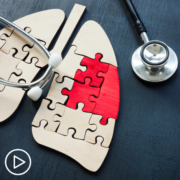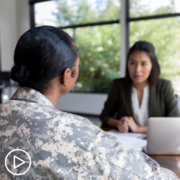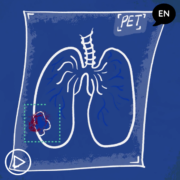Lung Cancer Archives
Lung cancer is the second most common cancer in men and women. About 14% of all new cancers are lung cancers.
The two main types of lung cancer are non-small cell lung cancer and small cell lung cancer. The types are based on the way the cells look under a microscope. Non-small cell lung cancer is much more common than small cell lung cancer
More resources for Lung Cancer from Patient Empowerment Network.
Advancements in Lung Cancer Clinical Trials | Updates for Veterans
Advancements in Lung Cancer Clinical Trials: Updates for Veterans from Patient Empowerment Network on Vimeo.
How can veterans help move lung cancer clinical trial advancements forward? Expert Dr. Drew Moghanaki from UCLA Health explains clinical trial groups that need more participants, available support resources for veterans, and patient advice.
[ACT]IVATION TIP
“…speak up and ask if there is a clinical trial that you may be eligible for to help another veteran. And, of course, when you enroll in a trial, you’ll be getting basically the best treatments that we think are available at this time.”
Download Resource Guide | Descargar guía de recursos
See More from [ACT]IVATED NSCLC Veterans
Related Resources:
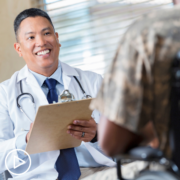
Combating Disparities: Veterans’ Healthcare Access and Quality |
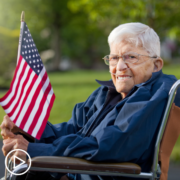
|
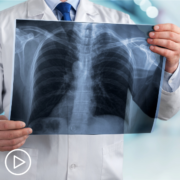
Veteran Lung Cancer Risk | Understanding Exposures and Screening Protocols |
Transcript:
Lisa Hatfield:
Dr. Moghanaki, can you speak to ongoing clinical trials and research specifically for veterans? And are there any clinical trials or research studies available that focus on lung cancer treatments specifically tailored to veterans from underrepresented communities?
Dr. Drew Moghanaki:
Yeah. So we want to focus on the people we care about the most, which for many of us are veterans, but at the end of the day, partnering nationally and globally in clinical trials is probably the best thing that we can do. We don’t really think that the lung cancer is…that our veterans are dealing with is necessarily different than what a civilian may be. So by partnering, we have bigger scale to tackle these problems and get these studies done as quickly as possible.
When it comes to underserved communities, same thing. We do the VA and VA researchers definitely make a point of trying to get more underrepresented communities access to clinical trials. But again, we just usually geographic challenges are our biggest barrier. Someone wants to live in this beautiful part of the country up in a mountainside near a lake, but they’re two-and-a-half hours away from a city. That can be challenging for us.
But the good news is that the VA does provide a lot of housing. So for those veterans who live far away, if they want to come, we’ll take care of them. We’ll provide, if they’re eligible for your VA healthcare, we’ll provide them housing. We can even provide them with their meals. And so, and get them access to the best care. So basically my activation tip here is to be aware that clinical trials are really critical.
It’s how we’ve moved forward. It’s a tremendous opportunity to help other veterans behind themselves who will get lung cancer in the future. There’s nothing we can do at this time to stop the number of people getting lung cancer. And so the more research we can do, the better this world can be. And my activation tip is to speak up and ask if there is a clinical trial that you may be eligible for to help another veteran. And, of course, when you enroll in a trial, you’ll be getting basically the best treatments that we think are available at this time.
Lisa Hatfield: Great. Thank you. Thank you so much. Those activation tips were really great and patient-centered. And I think that’s what, at least me as a patient, watching that in the audience, that’s what I want to hear is what can I do to help advocate for myself? So thank you for those responses.
Share Your Feedback
Lung Cancer Care for Veterans: Advancements in Radiation Oncology
Lung Cancer Care for Veterans: Advancements in Radiation Oncology from Patient Empowerment Network on Vimeo.
What should veterans with lung cancer know about radiation oncology advancements? Expert Dr. Drew Moghanaki from UCLA Health explains recent advancements in radiation oncology and radiotherapy, where the advanced therapies are accessible, and proactive patient advice.
[ACT]IVATION TIP
“…make sure you do your homework and try to make sure that the department of radiation oncology you’re going to really does have the best technologies. And there’s lots of different ways to look at this, including going online and reading more about what the quality of care might be in the community.”
Download Resource Guide | Descargar guía de recursos
See More from [ACT]IVATED NSCLC Veterans
Related Resources:

Combating Disparities: Veterans’ Healthcare Access and Quality |

|
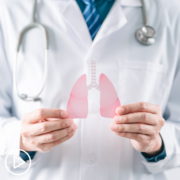
Advancements in Lung Cancer Clinical Trials Updates for Veterans |
Transcript:
Lisa Hatfield:
Dr. Moghanaki, are there any promising advancements or techniques in radiation oncology that could potentially improve outcomes for veterans with lung cancer?
Dr. Drew Moghanaki:
Yeah, there really are. So back in the old days, radiotherapy was just an open beam that we would shine towards a general area of the body. And they did a good job of getting control of the cancer, but, unfortunately, it would injure a lot of normal tissues. Today, radiotherapy is much more precise and targeted. In fact, our precision is within less than a millimeter of what we aim at. And so military analogy is this is like your best sharpshooter that can hit a small, less than a one-inch target from a 1,000 yards away.That’s basically what we’re able to do. We’re not a 1,000 yards away. The machine’s right there. We can see inside the human body. We can see the tumor, especially if it’s moving, and we can deliver highly concentrated high dose X-rays specifically to the tumor with a very little amount of exposure to the area around it.
So we’re just not seeing our patients getting injured from radiotherapy, and we’re seeing sometimes some situations up to 100 percent complete tumor control with no further growth. So it’s really important for veterans to know. So my activation tip is if surgery is on the table, you might want to check in with a radiation oncology team as well to see, well, is radiotherapy an option as an alternative? It might be safer and just as good and maybe better. So a lot of people don’t know about this because this is not taught as much, but radiotherapy is really one of the major forms of curative therapy for lung cancer.
Lisa Hatfield:
Okay, thank you. As a patient, I always have follow-up questions to clarify a couple of things. So I have another follow-up question to this, the question you just answered. So I know that not all veterans are seen at VA hospitals or VA facilities. If they are being seen at a VA facility, will they have access to the latest and greatest radiation radiotherapy services, or do only some centers have these special types of therapies?
Dr. Drew Moghanaki:
Yeah, well, when it comes to the VA’s commitment to provide the best care for every single veteran who’s eligible, there’s a logistical challenge in that it’s hard to deliver care to veterans everywhere, especially super sub-specialty care like thoracic surgery or radiation therapy. The equipment’s expensive. There’s a lot of staff that has to be hired. You can just look at airports. We don’t have a major commercial airport in every town and city in the U.S. They’re in major towns, major cities.
And that’s kind of how things are with the VA medical centers. And even when you look at the network of 130 VA medical centers in the 50 states of the U.S. only just more than 40 of them actually have radiotherapy on site at that VA medical center. So a lot of veterans who actually need radiation therapy are going to be getting that through the VA referred out to the community providers.
And so it’s important to if you’re at the VA, you’re very likely to get high-quality radiation therapy because a lot of oversight, the federal government’s watching. In fact, it’s the most regulated radiation oncology service in this country at this time. But if you’re going out into the community, make sure you do your homework. And my activation tip would be then make sure you do your homework and try to make sure that the department of radiation oncology you’re going to really does have the best technologies. And there’s lots of different ways to look at this, including going online and reading more about what the quality of care might be in the community.
Share Your Feedback
Are There Lung Cancer Outcome Disparities for Veterans?
Are There Lung Cancer Outcome Disparities for Veterans? from Patient Empowerment Network on Vimeo.
Do lung cancer outcome disparities exist for veterans? Expert Dr. Drew Moghanaki from UCLA Health discusses veteran outcome studies for civilian versus VA healthcare, efforts on improving outcomes over time, and proactive advice for accessing the best lung cancer care.
[ACT]IVATION TIP
“…if you’ve got cancer, to really understand lung cancer, to really appreciate that there’s been a lot of advances and if you’re not feeling that you have access to those advances, get a second opinion and go to a bigger place that actually has an integrated approach to lung cancer care with a multidisciplinary team with the doctors in different specialties are working together and are focused on giving the best lung cancer care.”
Download Resource Guide | Descargar guía de recursos
See More from [ACT]IVATED NSCLC Veterans
Related Resources:
Transcript:
Lisa Hatfield:
Dr. Moghanaki, can you discuss any disparities or differences in health outcomes among veterans compared to the general population when it comes to lung cancer treatment?
Dr. Drew Moghanaki:
Yeah, when it comes to lung cancer treatment, there’s new data that’s showing that since the discovery of better drugs and safer surgery and more effective radiotherapy, that survival rates are improving gradually, especially over the last 10 years. We’ve seen this same trend with VA data as well, that veterans, whether they’re getting care in a community or in the VA, the outcomes are getting better.
Are there disparities? Well, there’s notable disparities that we’ve identified which is that although outcomes in general are getting better for female and male and Black and white and other ethnic sections of the population, there continues to be a disparity in the civilian sector in that our Black patients, whether civilian or veteran, have inferior outcomes. And, of course, we know this is associated largely with other socioeconomic issues related to a long history of racism in this country that’s led to segregation and unequal access to health care and well-being opportunities.
But what we see in the VA, whether you’re Black or white, actually the outcomes are the same. So there’s something that VA is doing that’s addressing the barriers that are affecting people in the general population. And in fact, we see in some of our studies, Black veterans actually have better outcomes. And so we’re learning that it’s much more than just biology by itself, that there really are socioeconomic factors. And when you’ve got a healthcare system that’s more than just a healthcare system, it’s a benefit system as well.
We really provide a nice safety net that helps address those disparities. But the sad truth is that it definitely disparities do continue to exist outside the VA healthcare system. So my activation tip is, if you’re a veteran with maybe some less resources than others, again, check into the VA because the VA provides not just healthcare, but also a lot of support services, especially when you have lung cancer, which as mentioned, is just very difficult to deliver and requires more than just access to a doctor.
Lisa Hatfield:
And I’d like to mention a paper also that you published regarding improving outcomes over a certain time period. There was a paragraph in there where you had a discussion about potential contributing factors to the improvement of outcomes over time. Are you willing to discuss those a little bit, what those potential factors are for improving outcomes in patients with lung cancer?
Dr. Drew Moghanaki:
Yeah, there are three main components. One is making sure you get the diagnosis right. Making sure you do the right biopsies and you send the specimens for what’s called biomarker testing to make sure you know what type of lung cancer. There’s now more than a dozen different types of lung cancer. And if you don’t get that biomarker test, you’re not going to know. You’re just going to be treated with standard therapy. If you get the biomarker testing, you can get personalized medicine with a drug that’s more likely to work and probably safer than the older conventional chemotherapies, which still has a role. But sometimes we can skip chemotherapy altogether and go directly to a targeted therapy.
The second big advancement comes in the treatment delivery itself. So surgical treatments are now much less invasive than ever before. In fact, many of our patients, they go to the operating room, they wake up with four Band-Aids, and half their lung is removed. Remarkable technology using robotic and video-assisted technologies. Same with radiotherapy.
Patients lay on a table and the machine, the very sophisticated machine just rotates around them, zaps these tumors. The patient can actually drive themselves back and forth to treatment and go home and and live their lives. We’ve got patients getting lung radiotherapy, and they’re playing golf the next day. It’s unbelievable. And then the third really comes down to survivorship, which is that our patients, even if we really can’t cure their cancer, like a lot of advanced diabetes, we just can’t cure, we can keep our patients going as they live a high-quality life moving forward and make sure that their journey, unfortunately, with their lung cancer that they obviously didn’t ever want to have, that their journey is the best that it can be.
So my activation tip here is if you’ve got cancer, to really understand lung cancer, to really appreciate that there’s been a lot of advances and if you’re not feeling that you have access to those advances, get a second opinion and go to a bigger place that actually has an integrated approach to lung cancer care with a multidisciplinary team were the doctors in different specialties are working together and are focused on giving the best lung cancer care.
Share Your Feedback
Veteran Lung Cancer Risk | Understanding Exposures and Screening Protocols
Veteran Lung Cancer Risk: Understanding Exposures and Screening Protocols from Patient Empowerment Network on Vimeo.
What’s important for veterans to know about lung cancer risk? Expert Dr. Drew Moghanaki from UCLA Health discusses known veteran lung cancer risk factors, screening recommendations, and proactive patient advice involving the PACT Act.
[ACT]IVATION TIP
“…if you’ve had an office job, well, you probably have the same risk as your neighbor wherever you’re living. But if you were in a combat zone or on a base where there were a lot of chemicals, probably want to pay a little more attention and check in with your primary care doctor to get some appropriate screening tests for yourself.”
Download Resource Guide | Descargar guía de recursos
See More from [ACT]IVATED NSCLC Veterans
Related Resources:

Combating Disparities: Veterans’ Healthcare Access and Quality |

|
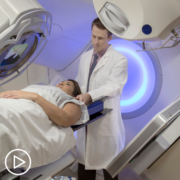
Lung Cancer Care for Veterans | Advancements in Radiation Oncology |
Transcript:
Lisa Hatfield:
Dr. Moghanaki, there is a stigma around military personnel being at higher risk for lung cancer than civilians. Is there an elevated risk for those in the military? If so, why and who should be screened?
Dr. Drew Moghanaki:
Yeah, the stigma of veterans being at higher risk for lung cancer is real. And I think Hollywood had a big role in it. And is it appropriate? Well, I never liked the word stigma, but I think it’s important for the public. And of course, soldiers or any military personnel who served in the armed forces appreciates that back in the days the bases were much dirtier than they are today. And there was a lot of exposure to a lot of things that can cause cancer and actually other health problems as well, such as diabetes and Parkinson’s disease and Alzheimer’s and other things.
So yes, it’s true that our veterans, especially if they were working around toxic chemicals or in the Middle East, where the open burn pits were leading to inhalation of a lot of toxic fumes, that these folks are at a higher risk and should be more proactive with any symptoms. So if you’re just a 45-year-old, 55-year-old male or female, and you’ve got a cough, generally speaking, you may not be so worried and just hope it goes away.
But if you’ve been on these dirty bases, it’s important to look into this and find out now how dirty are the bases? Well, there’s been the media I think over exaggerates exactly what was going on and what was on these bases. But there are lots of federal reports that have documented exactly some of the, for example, like if you were stripping aircraft with a certain stripping material, a lot of these substances are currently now chemicals are banned because we as soon as we learn that they’re toxic, we basically ban them.
But generally speaking, yeah, health concerns are a little bit elevated if you’ve served in the military and especially if you’ve been deployed in the field of battle. And so my activation tip is if you’ve had an office job, well, you probably have the same risk as your neighbor wherever you’re living. But if you were in a combat zone or on a base where there were a lot of chemicals, probably want to pay a little more attention and check in with your primary care doctor to get some appropriate screening tests for yourself.
Lisa Hatfield:
Are there any programs in place right now where veterans who’ve had those exposures or potential exposures, where they are being screened regularly or is it up to the veteran to ask that question?
Dr. Drew Moghanaki:
So if a veteran is plugged in with the VA healthcare system, the primary care network here is set up to offer the appropriate screening. But if you’re not, it’s important to look into this. Again, I’m just going to keep saying over and over again, if you’re a veteran who’s not yet eligible, if you know anyone, please check in. Congress has radically expanded the eligibility within the PACT Act is actually primarily centered around this issue of risk. It’s about toxic exposures that the VA is still learning about and VA physicians like myself are still learning about. And so these programs definitely exist to address them, but the best way to do it is to get registered for VA healthcare.
Share Your Feedback
Combating Disparities: Veterans’ Healthcare Access and Quality
Combating Disparities: Veterans’ Healthcare Access and Quality from Patient Empowerment Network on Vimeo.
Where can veterans locate quality healthcare and healthcare access? Expert Dr. Drew Moghanaki from UCLA Health shares information from VA healthcare research studies and proactive advice for patients to access the best care.
[ACT]IVATION TIP
“…make sure that the quality of care isn’t inferior, check in with the VA and see how they might be able to help you, especially if you’ve got lung cancer, because lung cancer care is complicated.”
Download Resource Guide | Descargar guía de recursos
See More from [ACT]IVATED NSCLC Veterans
Related Resources:

Veteran Lung Cancer Risk | Understanding Exposures and Screening Protocols |

|

Advancements in Lung Cancer Clinical Trials Updates for Veterans |
Transcript:
Lisa Hatfield:
Dr. Moghanaki, are there disparities in the quality of care received by veterans compared with other patient populations? And can you speak to the strategies or programs that have been effective in addressing barriers to healthcare access for veterans?
Dr. Drew Moghanaki:
I love this question because it is one of the most informative things that I’ve learned since becoming a VA physician. Study after study has shown that the quality of care received by veterans is equal or superior to that received in the community. And that’s largely in the VA healthcare system. So again, if you’ve got access to VA healthcare, I think you might be eligible, please look into it. The reports have been fantastic, and that’s because it’s a comprehensive approach to care. But for veterans who are receiving care in the community, it’s a little bit harder, actually it’s a lot harder to track. Because they may not be registered with the VA. And what’s happening, I saw the VA is happening outside the VA.
And I think that largely speaking veterans are just going to get the same kind of level of care as their neighbors might who are civilian. And so where they’re going for their care really affects that. Now, veterans may have more resources, because they can tap into the VA to find out where they may go. VA has incredible tracking systems, a lot of data to help us make better decisions and for them to make better decisions. And so my activation tip here is to make sure that the quality of care isn’t inferior, check in with the VA and see how they might be able to help you, especially if you’ve got lung cancer, because lung cancer care is complicated.
Share Your Feedback
Insights into Veteran Healthcare | Perspectives from VA and Civilian Systems
Insights into Veteran Healthcare | Perspectives from VA and Civilian Systems from Patient Empowerment Network on Vimeo.
What can veterans expect for the patient experience in VA versus civilian healthcare systems? Expert Dr. Drew Moghanaki from UCLA Health explains common experiences for veterans in VA and civilian healthcare systems and information about the PACT Act.
[ACT]IVATION TIP
“…be aware of who’s providing care, and obviously give them a break if they don’t understand anything about what it means to be a veteran. The quality of healthcare really builds upon a culture of trust. You may be better served finding other physicians or providers who are veterans themselves.”
Download Resource Guide | Descargar guía de recursos
See More from [ACT]IVATED NSCLC Veterans
Related Resources:
Transcript:
Lisa Hatfield:
Dr. Moghanaki, are there systemic issues within the healthcare system that disproportionately affect veterans?
Dr. Drew Moghanaki:
Well, this makes me realize that healthcare systems aren’t just automatic systems. They’re environments where there are people like myself who work in a healthcare system. And depending on where a veterans getting care, that staff may or may not know much about what it means to be a veteran. So let’s take three different examples. Obviously, if you come to VA Medical Center, our veterans, many of them told me they feel like they’re back on base. We understand the mission. We understand the cause. We understand the victory. We also understand the suffering. And we can connect better than anyone else in this country with veterans.
And we’ve got the access to the best treatments available to truly take the best care that we can with a comprehensive approach through the VA healthcare network, which now consists of over a 1,000 clinics and over 100 high-quality, multi-functioning health care medical centers. But let’s take option number two, where a veteran may be receiving care in a community hospital. And in that situation, you may run across some of the healthcare providers who know something about what it means to be a veteran.
Either, if you’re lucky, they themselves were a veteran and provided some service, or they were raised in a family where they know other people who have served in the military and they understand the basic principles. And so those healthcare providers, even though they may be civilians themselves or veterans working in a community hospital, at least kind of get it.
But then there’s a third scenario where veterans will go to a community hospital, and the people taking care of them don’t really know what it means to be a veteran. They only know the television version or the Hollywood version of it. And they think they know, but they really don’t know. And I’ll tell you, that’s who I was when I first started working in the VA about 12, 13 years ago. And I’ve been so fortunate to get a lot of lessons on what it means to be a veteran. And over time, I’ve gotten to know a lot of soldiers and veterans myself just in my personal life to truly understand. And so I think my activation tip for here is to really be aware of who’s providing care, and obviously give them a break if they don’t understand anything about what it means to be a veteran.
The quality of healthcare really builds upon a culture of trust. You may be better served finding other physicians or providers who are veterans themselves. And, of course, if you’ve got access to VA healthcare, check-in with the VA Medical Center and see, hey, what’s the quality of my care here? And I’ll probably be saying this later on in this recording, which is that if you are a veteran and not yet eligible for VA healthcare, please do check in because the PACT Act recently approved by Congress has truly expanded eligibility, and you may be eligible and not know about it.
Share Your Feedback
Do Black and Latinx Veterans Face Unique Lung Cancer Challenges?
Do Black and Latinx Veterans Face Unique Lung Cancer Challenges? from Patient Empowerment Network on Vimeo.
What unique challenges do Black and Latinx veterans face in lung cancer? Expert Dr. Drew Moghanaki from UCLA Health explains the importance of trust, second opinions, and proactive advice for the best care.
[ACT]IVATION TIP
“…for anyone who might have some trust concerns. No one owns you as a provider that you have to get care from them. If you’re comfortable, you can ask for a second opinion. If not, it is absolutely okay. Patients all the time are getting second and sometimes even third opinions. And I strongly recommend getting another opinion if you’ve got any questions or doubts, because that trust alliance is so important to get the best lung cancer care…”
Download Resource Guide | Descargar guía de recursos
See More from [ACT]IVATED NSCLC Veterans
Related Resources:
Transcript:
Lisa Hatfield:
Dr. Moghanaki, what specific challenges do veterans from the Black and Latinx communities face when trying to access healthcare services, and what are we learning from these challenges, and how is that information shaping care for veterans facing lung cancer?
Dr. Drew Moghanaki:
Well, this question just reminds me that healthcare is complicated, especially lung cancer care. And the most important thing for anybody getting care, regardless of what social, economic background or ethnic background they may be from, is to find a team that you trust and who you know will care about you. And that’s the best way to make sure you get the best treatment. I myself as a physician. I’ve also been a patient at times. And if I don’t trust my care provider, I basically ask for a change. And I know that can be difficult.
And so here’s my activation tip for anyone who might have some trust concerns. No one owns you as a provider that you have to get care from them. If you’re comfortable, you can ask for a second opinion. If not, it is absolutely okay. Patients all the time are getting second and sometimes even third opinions. And I strongly recommend getting another opinion if you’ve got any questions or doubt, because that trust alliance is so important to get the best lung cancer care, because it’s not going to be a one-time visit. You were talking about relationships that can last months or even years to get the best treatment for your lung cancer.
Share Your Feedback
Lung Cancer Strategies for Veterans: Research and Care Insights
Lung Cancer Strategies for Veterans: Research and Care Insights from Patient Empowerment Network on Vimeo.
What’s important for veterans with lung cancer and care partners to know about research and care? Expert Dr. Drew Moghanaki from UCLA Health discusses research initiatives, screening recommendations, and patient advice for proactive care.
[ACT]IVATION TIP
“…if you’ve got a cough that won’t go away, push hard to say, ‘Look, I really just want to take a look inside my chest.’ It won’t be a low-dose screening chest CT. It’ll be a regular chest CT. And that CT, even if normal, can be a nice baseline for future scans in the future if more scans are needed.”
Download Resource Guide | Descargar guía de recursos
See More from [ACT]IVATED NSCLC Veterans
Related Resources:
Transcript:
Lisa Hatfield:
Dr. Moghanaki, can you speak to your research around strategic initiatives for veterans facing lung cancer? And what should your patients, their care partners be asking as they seek care?
Dr. Drew Moghanaki:
I really care about driving down the symptoms and the burden of lung cancer, and there’s a lot of great treatments out there that are safer and more effective than ever before. Our patients are living better lives and longer lives, and I really focus a lot on that type of research. But one of the things that really probably has the biggest benefit is just earlier detection. And early detection takes place by having an annual chest CT scan with a certain type of CT scan that’s a lower dose of radiation that the scan requires. And we don’t scan people who have symptoms.
So I’m talking about people who are at risk. And right now, our best measure of who’s at risk for getting lung cancer are people who smoked a lot of cigarettes in their lifetime. And they basically once a year get a scan, and we’re looking for lung cancers at the earliest time that they’re sprouting, and that’s because if we catch it early, we’ve got the safest treatments and the most effective treatments and the highest cure rates, and so my activation tip is if you know anybody or if you yourself are at risk for lung cancer because there’s a lot of smoking going on, please get your lungs screened and talk to your primary care provider to get that lung screening scan ordered.
Lisa Hatfield:
Okay. And just a follow-up question for that, if a person does have some type of symptoms, or if I guess if they’re a smoker also, but they have some type of symptoms and they say, “Oh, I’d like to have this low dose chest CT scan.” Can they just ask their primary care provider about that? Or are they, are PCPs automatically going to screen people who have symptoms or have been long-time smokers?
Dr. Drew Moghanaki:
It’s really a standard of care to get some imaging of the chest. If you’ve got somebody with a cough that won’t go away or some sort of pain inside the chest. In that situation, we don’t get a low-dose chest CT. We get a regular CT to take a look. Now, one of the things is if a patient has smoked a lot, people really start to worry, this might be lung cancer. But one of the things that we’re seeing is there’s a lot of people getting lung cancer who never smoked or they just smoked a little bit. And the doctor may say, “Well, I don’t think you’re going to get lung cancer.” And they don’t get a scan. And that’s actually a problem.
So for those patients, my activation tip is, look, if you’ve got a cough that won’t go away, push hard to say, “Look, I really just want to take a look inside my chest.” It won’t be a low-dose screening chest CT. It’ll be a regular chest CT. And that CT, even if normal, can be a nice baseline for future scans in the future if more scans are needed. It’s always good to have a baseline at an earlier age, so we can see if new things show up, if they’ve been there for a while, or if they really are new.
Share Your Feedback
How Can Advanced Lung Cancer Be Explained to Newly Diagnosed Veterans?
How Can Advanced Lung Cancer Be Explained to Newly Diagnosed Veterans? from Patient Empowerment Network on Vimeo.
How can newly diagnosed advanced non-small cell lung cancer (NSCLC) veterans be informed about their diagnosis? Expert Dr. Drew Moghanaki from UCLA Health discusses the approach and information he shares with veterans and proactive advice for their care.
[ACT]IVATION TIP
“…all veterans to ask their clinicians, ‘Is my cancer the spreading type or not?’ Because that really helps understand what treatments and why what treatments are being recommended.”
Download Resource Guide | Descargar guía de recursos
See More from [ACT]IVATED NSCLC Veterans
Related Resources:
Transcript:
Lisa Hatfield:
Dr. Moghanaki, how do you explain advanced non-small cell lung cancer to your veteran patients and their care partners and families?
Dr. Drew Moghanaki:
Yeah, I’m glad you bring this question up. So non-small cell lung cancer often can be localized or it can be advanced. And localized means, as far as we can tell, it’s only in one area but advanced means that it’s started to spread, and they can spread to the lymph nodes and then other parts of the lungs or even other parts of the body. And I try to teach all my veterans, look, we’ve got surgery, we’ve got radiotherapy, and we’ve got drug therapies. And if it’s spreading, we really need the drug therapy to put the drugs into the bloodstream and be able to chase down the cancer wherever it may be.
Because also once it’s starting to spread, there’s going to be not just visible components that we see on the scan, but very likely invisible components. And if tumors are invisible on the scans, well, there’s nothing to cut or to aim at with radiotherapy. So really drug therapy becomes a cornerstone. So I recommend to all my veterans with lung cancer to make sure there’s a clear understanding. “Has the cancer spread yet? Is it the spreading type or not?” Because that really then helps better understand why the different treatments are being recommended.
So my activation tip is for all veterans to ask their clinicians, “Is my cancer the spreading type or not?” Because that really helps understand what treatments and why what treatments are being recommended.
Share Your Feedback
Combat and Courage | A Veteran’s Lung Cancer Battle
Combat and Courage: A Veteran’s Lung Cancer Battle from Patient Empowerment Network on Vimeo.
Derrick, a resilient veteran and lung cancer survivor graciously opens up about his journey, detailing his experience from initial screening and diagnosis through to treatment. He candidly discusses crucial aspects of lung cancer care for veterans and offers insights drawn from his journey. In Derrick’s own heartfelt words, he emphasizes the importance of empowerment through knowledge, stating, “It’s your body and your life, and you deserve to learn all you can to gain knowledge and confidence about your cancer.”
Download Resource Guide | Descargar guía de recursos
See More from [ACT]IVATED NSCLC Veterans
Related Resources:
Transcript:
Derrick:
Being ACTIVATED in your lung cancer care is a necessity, take it from me.
After my friend who I served with in Iraq was diagnosed with lung cancer, I knew that it was time to get serious about my lung cancer screenings at the Veterans Affairs Hospital. As a lung cancer survivor, I want to share my story as a Black military veteran. Lung cancer is the leading cause of cancer-related death in veterans, and Black veterans are less likely to complete lung cancer screening. However, a recent VA report showed that Black veterans receive equal or superior care through VA hospitals in comparison to Black patients in the general population.
I was already 52 when I received my first lung cancer screening. I only learned later that I should have started receiving screening at age 50 at the VA. It was winter when I went in for my screening. I’d had a nagging cough but didn’t think twice about it. It was a winter season with multiple respiratory viruses circulating at the time. I was shocked when the radiologist informed my doctor that they found a spot on one of my lungs. I felt like I wasn’t old enough to have cancer.
I was really nervous about it beforehand, but I had surgery to remove the tumor from my lung. I felt fortunate to have my friend I served with to talk with about lung cancer, but I know not everyone is this fortunate. I’m sharing my story in the hopes that it will help other veterans. I continue to receive regular scans of my lungs and urge other veterans to start your lung cancer screening on schedule. Ask your doctor or VA administrator if you’re unsure about when you should start. It’s your body and your life, and you deserve to learn all you can to gain knowledge and confidence about your cancer.
There have been a lot of recent advancements in lung cancer diagnosis and treatment. I hope that sharing my perspective will make a difference for other veterans. We served proudly for our country, and we deserve the best lung cancer screening and care as part of the respect that we earned.
Stay [ACT]IVATED with these tips.
- Don’t allow stigmas to keep you from getting the best care, now is the time to get the right care no matter how you got the cancer.
- Ask your care team questions to learn about treatment options and what to expect during and after treatment.
- Ask if a clinical trial may be a potential treatment option for you.
- Stay abreast of lung cancer treatment options and research advancements
Whether it’s combat in war or fighting cancer, no matter who you are, being proactive is everything. Stay [ACT]IVATED by being informed, empowered, and engaged in your care.
Empowering Lung Cancer Patients | Embracing Hope, Treatment, and Teamwork
Empowering Lung Cancer Patients: Embracing Hope, Treatment, and Teamwork from Patient Empowerment Network on Vimeo.
What does the future of non-small cell lung cancer (NSCLC) treatment and care look like? Expert Dr. Samuel Cykert from UNC School of Medicine shares his outlook about the future of care and his advice to patients to help build emotional support.
[ACT]IVATION TIP
“…don’t give up, and one thing I’ve heard from patients over time, particularly among Black patients, there’s a tremendous faith community, and understanding that tremendous faith, faith is excellent, but also use that faith to understand that your belief in God, your interaction with God, God is using those doctors and those healthcare professionals to help you, so it’s not a solo effort, get everybody on the team.”
Download Resource Guide | Descargar guía de recursos
See More from [ACT]IVATED Non-Small Cell Lung Cancer
Related Resources:
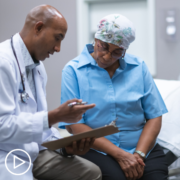
|

Improving Biomarker Testing Access for Rural Lung Cancer Patients |

How Can We Advance Equitable Access to Precision Medicine in Lung Cancer Care? |
Transcript:
Lisa Hatfield:
If you could give one suggestion to patients out there who may not be following up with their appointments, perhaps also in addition to the racial disparities? The unfortunate stigma surrounding lung cancer, and I wonder sometimes if that’s a barrier to continuing treatments or going to appointments, you could give one suggestion or sentence of encouragement to patients to seek out those high volume facilities if they’re diagnosed, if there’s a suspicion of lung cancer and to continue with treatment, what would your message be to those patients?
Dr. Samuel Cykert:
My message to patients, really it’s two-fold. On the medical side, lung cancer deaths are falling, all cancer deaths are falling, and they’re falling because of earlier detection, but they’re also falling because of these new treatments. And so it’s really, really important, particularly if you’re physically able, if you have a good functional status and you’re able to walk around and do things, it’s important that you really, really consider aggressive treatments because lung cancer isn’t an immediate death sentence anymore.
It is true that there are some lung cancers that are not curable, but with some of the new biologic treatments and chemotherapy regimens, people can live years with a good quality of life, even with some advanced lung cancers. So my advice on that side is don’t give up, and one thing I’ve heard from patients over time, particularly among Black patients, there’s a tremendous faith community, and understanding that tremendous faith, faith is excellent, but also use that faith to understand that your belief in God, your interaction with God, God is using those doctors and those healthcare professionals to help you, so it’s not a solo effort, get everybody on the team.
Lisa Hatfield:
Great message. Everybody on the team, I like that. Thank you, Dr. Cykert, and I appreciate all of your answers, and I’m hoping that this message, what people are watching that, understanding those statistics from your research, people who sometimes miss appointments or have transportation issues, maybe this will inspire them to continue finding ways to get there and to keep going, to keep fighting it and getting everybody on their team, I appreciate your message a lot. Thank you.


